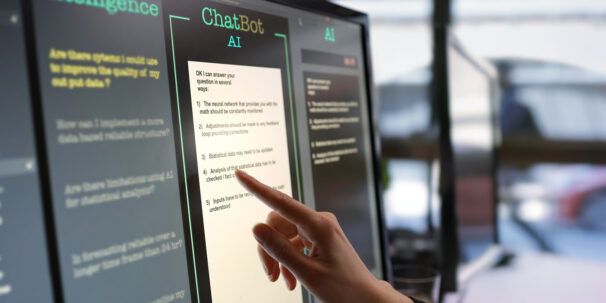Future-proof your career: Lifelong learning in the age of AI
Discover how lifelong learning could be the key to evolving your skillset and keeping up with emerging technologies like AI.

No matter how you feel about the rise of artificial intelligence, there’s no doubt that we’re entering a new age of technology. The rapid growth of AI was recently exacerbated by the creation of ChatGPT and other generative AI interfaces, all in quick succession.
For as long as AI has existed in popular media and cultural conversations, people have feared the notion of robots taking all of our jobs. While sentient AI is a long way off, the time has come for a frank conversation about the future of work and how humans can evolve their skillsets to keep up with changing times.
So, if you’ve ever been worried about the longevity of your career or industry in an increasingly digital world, you’re in the right place. We’ll explore how society has evolved in the past to make room for disruptive technologies, how to use AI to your advantage, and why lifelong learning could be the answer to your problems.
How has AI already impacted industries and job markets?
Especially in recent months, conversations about AI have been taking centre stage in the workplace. But how exactly has AI changed the face of different industries and markets?
1. Loss of jobs
Let’s tackle the most pressing issue first. Research carried out by Goldman Sachs suggests that as many as 300 million jobs could be threatened by AI. That doesn’t mean it’s happening right now, but according to experts, it’s highly feasible.
But exactly which jobs are at risk? Well, quite a few. Media jobs, particularly those that involve content creation, are at risk because of ChatGPT’s ability to report and write efficiently based on prompts. CNET, a technology news outlet, even admitted that they used ChatGPT to write over 70 articles in a three-month-long “experiment with automation”.
Some other roles that could be at risk include paralegals, analysts, designers, accountants and customer service agents – all of these jobs involve tasks that AI may be able to do more quickly and efficiently.
However, it’s essential to point out that these jobs are still unlikely to be carried out by AI alone – human judgement is very much needed. Take, for example, CNET, which ended up having to make major corrections to its AI-written articles due to inaccuracies. So, it’s far more likely that these at-risk jobs simply evolve to make room for AI.
2. Automation of repetitive tasks
This point is very much related to the last one and explains why certain jobs are more at risk than others. For many of us, especially office workers, our normal working day consists of at least some menial and repetitive tasks. Recent developments in AI have meant that it’s much more efficient for AI to automate these tasks.
Some examples of tasks that AI can automate include writing articles, creating code, rating CVs, predictive analytics for hiring, and customer service (chatbots). Goldman Sachs projected that 29% of computer-related job tasks could be automated by AI, as well as 28% of work by healthcare workers.
3. Creation of new jobs
Moving onto the silver lining – the loss of jobs due to AI advancement doesn’t necessarily mean that there will be fewer jobs for humans to go around. Gail Arnon, CMO of freelance company Fiverr claims that AI is creating new jobs and opportunities for freelancers, because it speeds up manual and analogue work, meaning they have more time to focus on creative and interpersonal tasks (the interesting stuff).
But what are some examples of these new jobs? While many roles will simply evolve, we are starting to see many more AI-related job ads pop up on hiring boards. From prompt engineers and AI trainers to integration managers and AI ethics specialists, get ready for a new wave of tech employees.




4. Rise in demand for soft skills
There are some areas where AI simply can’t scratch the surface. Soft skills fall under this umbrella – it’s highly unlikely that we’ll be praising AI for its leadership abilities, networking prowess or emotional intelligence any time soon.
This is our chance to capitalise on the changes brought about by AI in the workplace. By learning and developing your soft skills, you can demonstrate talent and potential that goes beyond AI’s capabilities. So, the next time you’re wondering how to develop your career, take a moment to consider how strong your communication or decision-making skills are.
5. Different skillsets required for jobs
If you work in an environment that’s been affected by the rise of AI (let’s face it, that includes most of us), you’ll need to adapt your skillset to work alongside AI, rather than against it. This will look slightly different for everyone, but it could be worth brushing up on your technical skills.
For example, could it be beneficial to start coding? Should you learn how to optimise AI prompts? Or will understanding how natural language processing (NLP) works help you thrive in your new normal?
However, if you want to hear from the experts, they’ll tell you that soft skills are where it’s at. Microsoft’s new Work Trend Index report, which surveyed 31,000 people across 31 markets earlier this year, found that the top three skills leaders believe are essential for an AI-powered future are analytical judgement, flexibility and emotional intelligence.
6. Changes to the gig economy
Businesses that operate in the gig economy are likely to find that AI makes their operations more efficient and less expensive – but this has an implication for freelancers who rely on the gig economy for income. AI automation of these jobs could lead to a loss of income for workers, who may struggle to find well-paid work.
However, there are still some benefits for gig economy workers. AI-powered algorithms will allow workers to be more easily matched with projects and work that matches their skillsets and passions.
How has society coped with disruptive innovations in the past?
You may be feeling worried about the future of work (or the future, full stop) as a result of these new AI developments, but keep in mind that society has evolved to thrive in vastly different landscapes before, simply by learning and adapting.
So, let’s dive into some industry-altering innovations from the past and remind ourselves of the human ability to adapt to technological advancements through upskilling and reskilling.
The first industrial revolution: Rise of urban society
In the 18th and 19th centuries, rural, agricultural societies in Europe and North America became industrialised. Many people previously worked as farmers and found their land being taken over by factories and machinery.
However, in the face of all this change, many workers reskilled to become factory workers, mechanics, smiths, textile workers and miners. Wages improved, and there was a huge spike in economic growth. Of course, there were new problems created too (pollution, poor living conditions), but the world of work simply evolved with the times.
The second industrial revolution: Electricity and mass production
Between 1870 and 1914, the second industrial revolution took place. This saw huge growth in existing industries such as steel and oil, and major technological advancements like the invention of the telephone and lightbulb.
As with the first revolution, there were temporary job losses, but this didn’t last long. With the arrival of new technologies came the birth of new jobs, many of them in electricity, the steel industry, transportation and telecommunications. Workers then aligned their knowledge and skills to the demands of their new realities and ended up better for it.
The third industrial revolution: Digital revolution
With the digital revolution, we’re stepping into more familiar territory. This period of time refers to the progression of technology from being electronic and mechanical to existing completely in the digital realm. Advances from this time include the computer and the Internet.
When the Internet was created, people believed that life as they knew it was over, including their careers. Although they were partially right – things have never been the same since the dawn of the Internet – thousands of new careers were created during the digital revolution. This led to new skills becoming desirable, such as typing and coding, and workers reskilling to match the demand for these new careers.
The fourth industrial revolution: Advanced technology becomes embedded in society
We’ve made it to the present day – we’re currently witnessing the fourth industrial revolution. This time period is largely an extension of the digital revolution, but this time, we’re seeing digital technology become even more embedded within human society.
Examples of advanced, emerging technologies from this revolution include AI, quantum computing, nanotechnology, the Internet of Things and autonomous vehicles, just to name a few.
While there are clearly a huge number of ethical and societal considerations to be had regarding this influx of technological advancement, history has shown us time and time again that our working lives are able to withstand enormous amounts of change when we learn new skills.




How to thrive in an AI-driven world and fast-track your personal and professional development
So, what can you do, right now, to ensure your survival in an increasingly AI-driven world and working environment? Well, you can start with upskilling, particularly when it comes to soft skills. As we previously mentioned, soft skills are likely to become superpowers for humans trying to make their mark at work.
But what else should you do to prepare yourself? Below we’ve listed some top tips to help you face any upcoming challenges.
- Learn to use AI prompts. Everyone’s going to start using AI to make their working lives easier – so you may as well get on board. Start learning how to use AI prompts to your advantage, and you’ll likely impress at work.
- Automate your own repetitive tasks. Whether you can reduce the amount of time you spend researching, writing, analysing or planning, getting AI to automate those repetitive and menial tasks at work will give you more time to work on the things that excite you.
- Find job roles that tick all of your boxes. Not feeling satisfied in your current career? You can use AI to find jobs that suit your skills, experience and passions. What’s more, it can help you perfect your CV and cover letter, automate job applications, and prepare for interviews.
- Build strong relationships. Human connection can’t ever be replicated by AI, so you should take full advantage of that. Use your social skills and networking abilities to make connections that will help to grow your career and open you up to a world of opportunities.
Lifelong learning as an antidote to ever-evolving market demands
Quite possibly the best thing you can do to prepare for an AI-powered world is embrace lifelong learning. Our pace of life is faster than ever before, and it doesn’t seem to be slowing down.
“The growth of AI constitutes the latest iteration of the always-evolving demands of the job market”, says Vitaly Klopot, Chief Operating Officer at FutureLearn.
“With a ‘job for life’ now a thing of the past, it has never been more important to engage in lifelong learning, upskilling and reskilling in order to meet these growing demands.”
“Whether focusing on specific development goals, like learning soft skills and increasing digital literacy, or reskilling to meet the demands of an entirely new profession, lifelong learning can be the key to unlocking your potential.”
Invest in your future with FutureLearn
Lifelong learning is at the heart of our mission at FutureLearn, and we have something for everyone, no matter what stage of your career you’re at. In our Future of Learning Report 2022, we found that 81% of career switchers who took an online course said it helped them to change their career path.
And switching careers isn’t the only reason you should turn to online learning – in the current landscape, learning new skills online is a great way to keep up with changing demands and stand out from the crowd.
If you want to commit to just a little bit of learning every day, with access to 1000+ courses across all subject areas, our Unlimited subscription could be the perfect way to start building your knowledge and expertise.
If you want to dive into a specialist subject area and close some of your skills gaps, one of our accredited microcredentials might be a better solution for you. You may even be curious about our growing portfolio of online degrees.
Whatever you decide, we know that investing in your future through learning is a bulletproof way to ensure career stability, growth and success.








